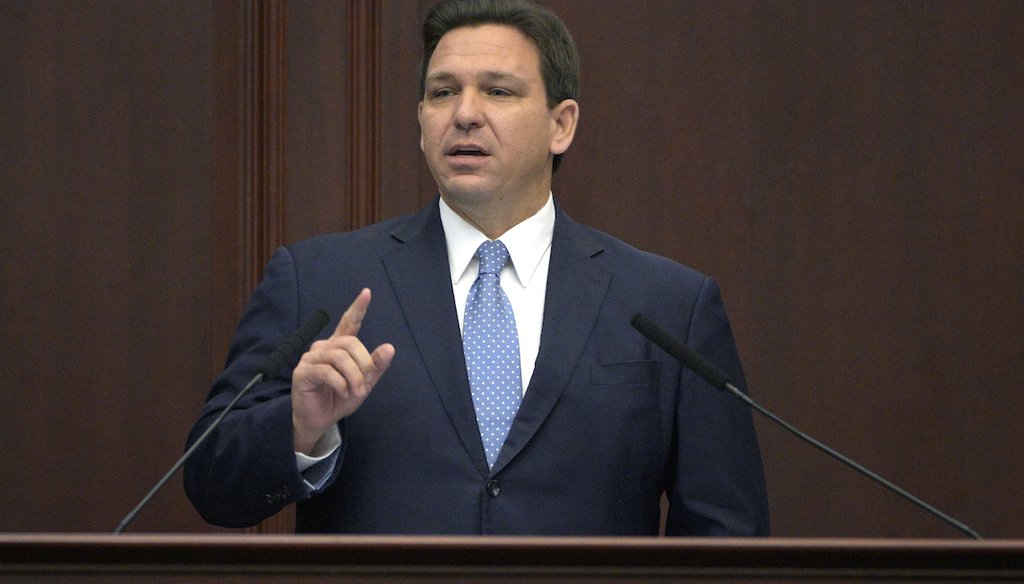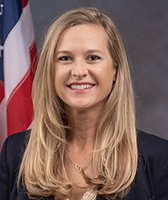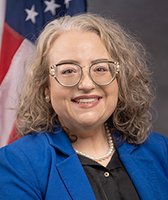Get PolitiFact in your inbox.

Florida Gov. Ron DeSantis addresses a joint session of a legislative session on Jan. 11, 2022 in Tallahassee.
If Your Time is short
-
Democratic candidates for governor criticized Florida Gov. Ron DeSantis for not divesting $300 million in Russian businesses immediately, saying inaction amounts to support of the Russian regime.
-
DeSantis said these retirement funds cannot be redirected due to Russia’s closed market and a state law that says administrators have to make decisions that won’t hurt the fund.
-
Experts told PolitiFact that other states with similar restrictions have at least signaled their intentions to redirect Russia-linked investments, and that the assets don’t amount to very much right now.
States across the U.S. have scrambled to punish Russia financially over its invasion of Ukraine by drawing down investments into Russia-backed entities.
In Florida, there’s been a lot of talk about state investments with Russian ties — but so far, no action.
The state’s retirement system, which is the fourth largest in the nation, has more than $195 billion in assets. Before the invasion, Florida’s retirement system held investments in Russian-based entities that were valued at around $300 million, or about 0.15% of all assets.
Under pressure to redirect those assets, Gov. Ron DeSantis — who pushed for the state to divest from companies that boycotted Israel in the past — has said the Legislature should make the call.
"We’re going to look at that from a statutory perspective, because I think that’s the cleanest way to do it," DeSantis said at a March 29 Cabinet meeting. "Because once that’s there, you’ve got to operate within the confines of the law."
That reticence led his Democratic opponents for re-election to call him soft on Russia, saying DeSantis has more sway over Florida’s investment strategy than he lets on.
"Reminder: Ron DeSantis is choosing to keep $300,000,000 of Florida’s pension invested in Russia, hoping the country rebounds," Agriculture Commissioner Nikki Fried tweeted March 30. "He’s betting our pension on Russia."
PolitiFact decided to find out what could be done to withdraw Florida’s investment in Russia-backed entities.
We learned that the process by which Florida could begin to divest state funds from Russian-based entities is more complex than Fried presented. But there is more DeSantis could do to signal the state’s intentions.
The assets held by Florida’s retirement system are managed by the State Board of Administration, or SBA.
The SBA is governed by three trustees: DeSantis, Chief Financial Officer Jimmy Patronis, and Attorney General Ashley Moody. While Fried holds a statewide position and is a member of the Cabinet, she is not a trustee.
In a March 29 Florida Cabinet meeting, the four state officials heard from SBA interim executive director Lamar Taylor, who addressed the board’s review of Florida’s holdings in countries with emerging markets, like Russia.
The state’s holdings in Russian-based investments include Sberbank of Russia, the country’s largest lender; Rosneft, the Russian energy giant and the country’s third-largest company; and Magnit, one of Russia’s top grocery chains, among others.
Taylor explained that the SBA would continue to assess the situation in Ukraine, but if Florida were "forced to divest" immediately from Russian-based entities, it wouldn’t be in the "best economic interests"of the pension plan.
DeSantis responded that it would "violate your fiduciary duty if you liquidated at massive losses for political reasons rather than for the best interests of the beneficiaries."
Taylor agreed with DeSantis’ characterization.
Kent Perez, deputy executive director of the SBA, told PolitiFact that the value of Florida’s assets in Russian-based entities has "significantly declined" since it was assessed at $300 million on the Jan. 31 assessment, though he wouldn’t say by how much.
"The issue is mainly one of timing," said Jay Ritter, finance professor at the University of Florida. "Institutions know that if they rush to sell, the average price will not be as attractive as when they are more patient."
Further complicating Florida’s ability to divest the assets in Russia-based entities is that the country’s stock market is closed to foreign investors. Whether it wanted to or not, the SBA said it simply couldn’t divest the assets until the market reopens.
What the SBA could do, Ritter said, is commit to divesting the assets and develop a timeframe to do so.
In New York, for example, the state comptroller announced that the public pension fund’s holdings in Russian-based entities, which totaled $110 million, would be divested in a "prudent manner and time frame."
Fried pressed Taylor for an update on the value of Florida’s assets in Russian-base entities — which he said he couldn’t provide. Then DeSantis noted that there is interest in the Legislature to write a law allowing Florida to divest from countries that "are hostile to American interests."
When we asked experts about the state’s "fiduciary duty," they said the effect of divesting Russian investments would not be that significant. The share of Russian assets compared with the rest of the retirement fund’s portfolio is very small.
"That percentage of the portfolio relative to the other gains and losses that occur in a portfolio would simply be negligible," said Keith Brainard, research director for the National Association of State Retirement Administrators. "It’s too small a portion of the portfolio to have a material notice."
Brainard told PolitiFact that other states have Russian exposure in their retirement systems that are comparable to Florida’s.
Virginia Gov. Glenn Youngkin — a Republican — urged the state’s retirement system, which had around $100 million in investments, or 0.1%, linked to Russia, to sever economic ties to the country in an "orderly fashion."
Additionally, Florida could decide to divest in a timeline that would mitigate the risk of selling back assets at prices well below the original purchase price.
The debate in Florida is part of a broader push to build upon the punitive measures imposed on Russia by the federal government. Republican governors in Ohio and Iowa, for example, ordered that Russian-made products, such as vodka, be removed from stores.
More than 20 states have issued orders to either divest assets in Russian-based entities, or examine and terminate state contracts with Russian companies.
In California, the state Legislature introduced a bill that would require California Public Employees' Retirement System and California State Teachers' Retirement System — the two largest pension funds in the U.S. — to divest from Russian-related assets.
The funds collectively hold about $1.5 billion in such assets, according to Forbes.
Washington Gov. Jay Inslee issued an executive order requiring the review and divestment of "any commercial or other contracts, investments, and relationships between" the state and Russian entities.
Then there’s Florida. A week after the war started, Florida Rep. Andrew Learned, D-Brandon, introduced an amendment to another bill that would bar the SBA from investing the system’s assets in any company that does business with the Russian government.
The amendment was ruled out of order, and then the GOP House majority blocked Learned’s motion to waive the rules. The regular session ended, and so far there has been no indication that the special session set for April 19 will include issues beyond redistricting.
Still, Learned told PolitiFact that he hopes legislators will follow DeSantis’ suggestion and disentangle the state’s economic ties to Russia.
"This special session is an opportunity to divest Florida's Retirement System's investments in Russia and hold Putin accountable for his war crimes in Ukraine," Learned said.
Our Sources
Tampa Bay Times, Florida House avoids voting to divest from Russia over Ukraine invasion, March 3, 2022
Ron DeSantis, Florida Places Ben & Jerry’s Parent Company Unilever on Its List of Scrutinized Companies that Boycott Israel, Aug. 3, 2021
Charlie Crist, tweet, March 28, 2022
Nikki Fried, tweet, March 30, 2022
The Florida Channel, Cabinet Meeting, March 29, 2022
Email interview with Kent Perez, deputy executive director of the SBA, April 4, 2022
Email interview with Jay Ritter, finance professor at the University of Florida, April 4, 2022
Phone interview with Keith Brainard, research director for the National Association of State Retirement Administrators, April 1, 2022
Email interview with Andrew Learned, Florida representative, April 5, 2022
Reuters, New York state pension fund to divest Russia holdings, March 25, 2022
Nikki Fried, tweet, March 29, 2022
Glenn Youngkin, Governor Glenn Youngkin Calls for Decisive Action in Support of Ukraine, Feb. 26, 2022
Virginia Retirement System, VRS Statement on Russian Investments, March 9, 2022
Axios, Gov. DeWine orders Ohio to sever ties with Russia, March 4, 2022
Des Moines Register, Reynolds orders Iowa wholesaler to stop selling Russian-made liquor; vodka removed from some shelves, Feb. 28, 2022
California Legislature, SB 1328, March 3, 2022
Reuters, U.S. largest pension funds CalPERS and CalSTRS exposed to Russian assets, Feb. 25, 2022
Forbes, A Guide To The Public Pension Funds Divesting From Russia, March 11, 2022
Jay Inslee, DIRECTIVE OF THE GOVERNOR 22-03, March 4, 2022
Washington State Investment Board, WSIB statement on Russia investments, March 4, 2022
The Florida Senate, House Amendment HB 1551, March 3, 2022
Email interview with Christina Pushaw, DeSantis press secretary, April 6, 2022
Email interview with Erin Moffet, Fried spokesperson, April 4, 2022














































